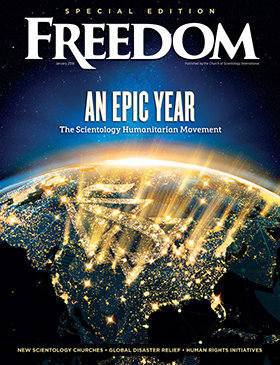


Official religious recognition for the Church of Scientology was signed into law by the governments of Mexico, Colombia and Macedonia in 2017, events that marked in each nation a history of religious commitment to the spiritual values of the Church, and to its mission to bring about a better society for all.
The declaration in Mexico distinguishes October 30, 2017, as a special anniversary within the Church, one that reflects a long commitment to improving lives. Mexico’s first Scientology organizations were established in 1975. Now, with a 35-year history of Scientology activity across the country, the Church has seen a rapid growth of its congregations.




Scientologists in Mexico City worked together to establish and open the first Ideal Church of Scientology Mexico in 2010 on Juarez Boulevard in the historic center of the city. It stands adjacent to Mexico’s Fine Arts Palace, the National Supreme Court, the National Bank and the National Palace.
The opening of the Ideal Church created a national headquarters for the numerous Church-sponsored humanitarian programs, which have now reached millions of individuals in Mexico and brought help to those looking for change in their personal lives and improvements in their communities.
Working with the nation’s citizens, its police and local government leaders, Scientologists have brought powerful anti-drug and human rights programs to bear on social ills, and the Church’s Volunteer Ministers have provided disaster relief efforts throughout the nation. These humanitarian initiatives reflect the religion’s steadfast adherence to both the spiritual well-being and to the welfare of the people of Mexico.
In acknowledgment, the Minister of Interior entered the Church of Scientology of Mexico into the federal registry of recognized religions, declaring the Church as an organization exclusively dedicated to religious aims with fully established scripture, practices, ceremonies and ecclesiastical structure.

Full religious recognition in 2017 in Colombia came as the nation itself witnessed a remarkable transformation and healing. The end to a bloody civil war in 2016, and successes against narco-trafficking have allowed the country to shed a reputation as home to a humanitarian crisis.
With the establishment of an Ideal Church in the nation’s capital of Bogotá in 2015, Scientologists have been hard at work to make a better Colombia for all posterity. Today, with Colombia at peace, tourism is up, drug trafficking down and human rights violations are no longer common practice. Violence is at its lowest ebb in decades. For many reasons, the country’s transformation is known as the “Colombian Miracle.”
Working from the headquarters of its Ideal Church, Colombian Scientologists have been helping blaze a new trail by bringing to citizens the ethical and moral values contained in The Way to Happiness, and Church-sponsored human rights education programs, along with the spiritual services that Scientology affords communities there. The young religion has grown worldwide because of its tremendous impact.


The full religious recognition for Scientology, ordered in May 2017, acknowledged that the Church of Scientology in Colombia is afforded all rights it is entitled to as a world religion, and also “enables institutional and public development of the entity’s religious activities,” as noted in a recent Brigham Young University Law Review article, “Law and Religion in Colombia.” The report observed that the declaration in Colombia “indicates that such entities deserve special recognition for their contribution to the good of society.”

More than 6,000 miles away, in Macedonia, where a Scientology Mission was first established in the ancient capital city of Skopje in 1998, there have been similar stories of strife and unrest, civil war, natural disasters, the nation’s independence from Yugoslavia, a crisis over refugees from the war in Kosovo and ongoing battles over political leadership.
But efforts and values expressed by Scientologists over human rights and moral decision-making have helped encourage peace and unity within the nation. In tune with the history of the Church within Macedonia, a major step forward occurred in April 2017 with the government’s declaration granting the Church equal religious status with all other Macedonian religions.















































